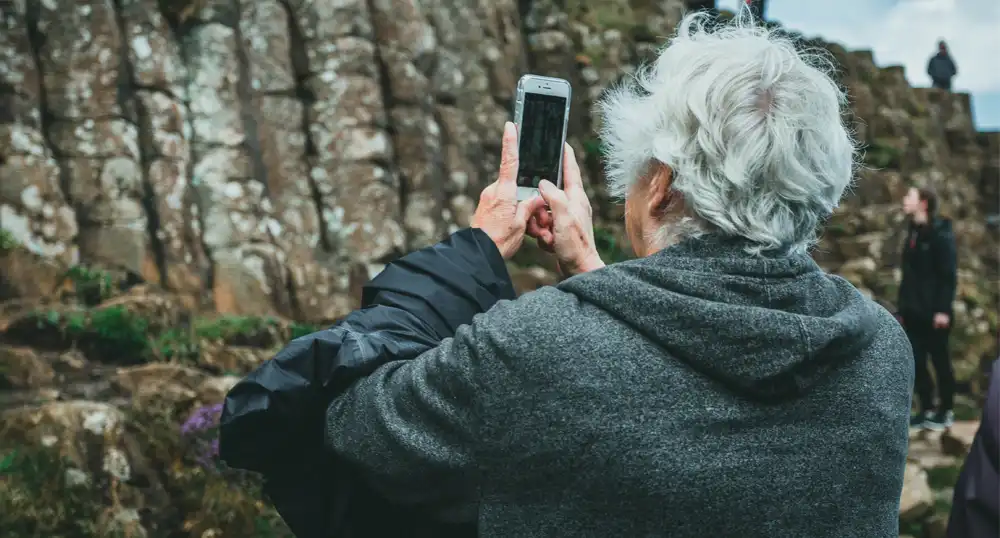Baby Boomer Travel Trends: More Trips, Richer Experiences
Travel Team | Jun 14, 2023

Baby boomers are continually proving that age is a state of mind. Born between 1946 and 1964, the “gray tsunami” generation that defined itself by breaking convention is now redefining the art of travel. Rather than slowing down, they’re hitting the road in search of opportunities for discovery and growth.
According to Expedia’s 2018 “Generations on the Move” report, most baby boomer travelers simply aren’t content with low-key vacations. They rank experiences like sightseeing and touring as the most important parts of travel.
This trend continued immediately after travel re-opened following the coronavirus pandemic. AARP reported that 25% of baby boomers who expected to travel internationally in 2021 said they were planning a bucket list trip, and Seven Corners saw a 54% increase in travel insurance purchased by baby boomers in 2022 compared to 2021.
This generation’s unwavering sense of adventure has challenged travel companies to rethink their approach with older and retired clientele. As a result, “experiential travel” has become a major industry trend.
What is Experiential Travel?
Experiential travel, also called “immersion travel,” is a type of tourism where visitors prioritize “experiencing” a destination by engaging with local customs, culture, and cuisine.
While it’s been argued all travel is experiential, what many baby boomers seek is authenticity, novelty, and human connection. Of course, self-contained experiences like resorts and cruises remain popular, but this older generation is increasingly shaking up its travel plans with hands-on learning experiences.
Because of baby boomers’ burgeoning interest in experiential travel, expert-led tours have become an especially attractive option.
Gone are the days of shuffling behind an umbrella-wielding tour guide. Many baby boomers have been booking smaller, niche tours led by local experts. And the options to meet this demand are endless: from an author- and historian-hosted tour of Quebec, to a culinary tour of Morocco, to a guided bicycle trip through Vienna and Prague.
Baby boomers are increasingly seeking educational travel experiences that offer the “behind the scenes” glimpse they crave.
Prior to the pandemic, instead of sticking solely with a pre-determined travel group, baby boomers were becoming increasingly interested in expanding their social circles while abroad. AARP’s 2018 Travel Trends report found that 53% of baby boomers were interested in dining with locals while abroad, while 49% expressed interest in participating in tours with locals (up from 40% in 2017).
AARP’s 2021 Travel Trends report showed a shift in baby boomers’ approach to pandemic-era travel. They played it more cautiously, focusing on domestic travel, road trips, traveling only with immediate family, and avoiding crowded destinations.
In 2022 and the early stages of 2023, however, many baby boomers seemed to be relaxing their self-imposed restrictions. American baby boomers who purchased travel insurance from Seven Corners in 2022 were traveling farther afield. The most popular destinations were Italy and the United Kingdom, compared to Mexico, Turks and Caicos, and Costa Rica in 2021.
Why Are Baby Boomers Opting for Experiential Travel?
Baby boomers and technology

There are plenty of theories why baby boomers have sought more adventurous travel options than their predecessors. One explanation is the unprecedented adoption of technology.
As a whole, baby boomers have been quick to adopt and embrace technology as an essential part of travel, with as many as 84% of the generation booking some of their travel accommodations online. What’s more, online reviews provide additional insight and advice, making it all the easier for baby boomers to find the right travel experiences for them.
Especially for travelers weighing the risks of taking a trip, as was certainly the case for baby boomers during the COVID pandemic, this research makes all the difference. Seven Corners research shows that baby boomers are waiting longer to book their trips, and they purchased Cancel for Any Reason (CFAR) coverage more frequently in the days immediately following COVID before the pandemic. This suggests that while they may be more willing to travel, they’re still not abandoning all caution. It’s this same “safety first” mentality that spurs them to online research.
In addition to navigating online tools, baby boomers have joined the ranks of content creators, and they are developing resources of their own. While much of the buzz about bloggers centers on millennial and Gen Z creators, there is a wealth of resources created by and for baby boomer-aged travelers.
TripAdvisor has a fantastic list of the top baby boomer travel blogs; My Itchy Travel Feet and Travel Past 50 are two standouts. Equipped with a wealth of digital tools and resources, baby boomers have everything they need to research, plan, and book adventures of their own.
Baby boomers’ flexible travel schedules
And, of course, there’s the matter of time and disposable income.
As more baby boomers enter retirement, they are granted a greater degree of flexibility while planning their travels. When compared to younger cohorts, baby boomers are more likely to travel for a week or longer, and they tend to book their trips well in advance.
This additional travel time means retired baby boomers can enjoy a more in-depth experience of their destination, rather than simply breezing through the highlights. Baby boomers also tend to “unplug” more easily while on vacation — especially compared to younger generations.
According to research from AARP, working baby boomers spend less than 10% of their vacation time answering emails or completing other work-related tasks. Extra vacation time and a more clearly defined work-life balance make it easier for this generation to engage in immersive travel experiences.
Whether working or retired, baby boomers have more discretionary income than some members of the younger generation. The Federal Reserve estimates that baby boomers held 51% of the country’s household wealth in 2022. That’s more than $70 trillion, at least some of which is spent on travel, entertainment, and other non-essential living expenses.
All of this points to baby boomers' ability to not only travel more frequently, but also more luxuriously. Seven Corners’ research supports this: “We’re seeing reports that many older American are taking roughly the same number of trips as they did before the pandemic,” says Seven Corners product marketing specialist, Angela Borden, “but when they do travel, they’re spending upwards of $1,000 more annually than three or four years ago.”
What Are the Best Vacation Destinations for Seniors?
For baby boomer travelers looking for adventure without overly chaotic hustle and bustle, Frommer’s has compiled a diverse list of destinations that will not disappoint. The best vacation destination for seniors is going to depend on the type of experience they’re seeking.
For road trip warriors and retirees living the RV life — traveling by personal vehicle or rental vehicle were overwhelmingly seen as the safest modes of travel in 2021, regardless of generation — there are many domestic travel destinations worth exploring. Visiting U.S. national parks is a budget-friendly way to explore the many unique landscapes the country has to offer. Seniors can even get a lifetime pass for all national parks at a very low rate.
Additionally, active seniors looking for outdoor adventure and unique experiences domestically may want to consider Alaska or Santa Fe, New Mexico. In Alaska, you can opt for picturesque train rides or view its incredible landscape via helicopter or small plane. Depending on the time of year, it’s also possible to catch a glimpse of the Northern Lights.
History buffs with a preference for warmer climates can find what they seek in Santa Fe’s art-worthy mountain views and rich, cultural history.
Seniors looking to see the world might also enjoy visiting Central Europe and taking a river or bike tour to explore historic castles, landmarks, vineyards, and so much more. With a variety of guided tours available, this region is an excellent option for tourists who want an immersive yet low-key European experience.
Apart from Europe, Israel is shaping up to be one of the most popular destinations in 2023 among most generations, including baby boomers.
Travel Organizations for Seniors

There are a variety of options for seniors looking to book a group travel experience. Some of these companies cater specifically to travelers aged 50 and over and offer packages tailored to a range of activity levels.
Here are a few senior-friendly travel companies we recommend:
- Trafalgar: a top-rated travel company with senior-friendly packages all over the world
- Road Scholar: a nonprofit organization dedicated to providing learning and travel experiences for adults, offering cost-effective travel tours based on interest and activity level
- Walking the World: ideal for active senior travelers looking for unique walking tours both domestically and abroad
- ElderTreks: an adventure travel company designed for travelers 50 and over, offering a wide range of experiences across 100 different countries
Choosing the adventure is only the first step. It’s also important for baby boomers to get the right travel insurance to stay protected.
What Is the Best Travel Insurance for Seniors?
The best travel insurance for seniors should offer a wide range of benefits like trip cancellation, lost baggage protection, medical coverage, emergency medical evacuation, and more. Especially during these times, your health needs to be safeguarded while traveling.
Seven Corners Trip Protection plans offer benefits for trip cancellation, interruption, and delay. They also provide medical coverage for illnesses and injuries that occur during your trip, an important benefit that many countries require for entry.
Cancel for Any Reason coverage, an optional benefit you may be able to add to your Trip Protection plan, became increasingly popular during the pandemic due to the flexibility it offers travelers. Without CFAR, if you cancel your trip, you are only eligible for reimbursement if the cancellation was triggered by specific covered reasons listed in your plan document.
However, with CFAR, you can cancel your trip and receive reimbursement for up to 75% of your prepaid, nonrefundable trip expenses regardless of the reason you chose to cancel. For anyone, baby boomers included, who wants the extra flexibility to protect their trip during uncertain times, CFAR can provide that option.
Contact us for a quote and to learn more about our travel insurance offerings.
Search Posts
Receive our monthly inspiration and travel tips from the travel insurance experts.
Sign me upThis website and various social media updates provided by Seven Corners contain content, information, articles, videos, and links to websites created by third parties. Seven Corners, its owners, and its employees neither endorse nor are responsible for the accuracy, timeliness, or reliability of any third-party information, statements, opinions, or advice and are not liable for any loss, harm, or damage caused by your reliance upon them. Use of such information or the linked websites is entirely at your risk. Concerns regarding this third-party content should be directed to the third party. Seek professional advice, as appropriate, regarding your use of such information and websites.
Because the information on this website and in Seven Corners’ blogs and other social media is written and compiled using knowledge and information available at a certain point in time, it may become outdated. For that reason, information, events, legal requirements, and product changes (including benefits, limitations, exclusions, and services) may not be up-to-date, complete, or accurate at the point in time it is being read. Again, use of such information is at your risk.
